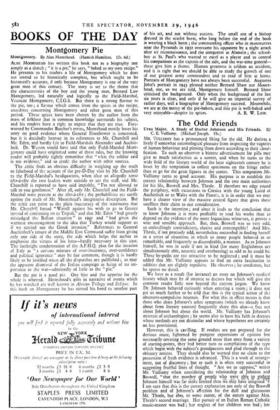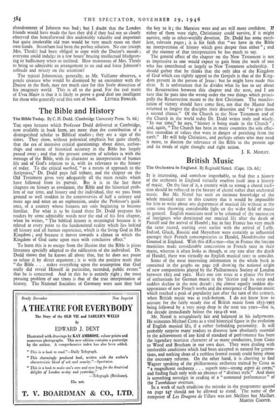The Odd Friends
Ursa Major. A Study of Doctor Johnson and His Friends. By C. E. Vulliamy. (Michael Joseph. 15s.) MR. VULL1AMY has a pronounced liking for the old. He derives a lively if somewhat entomological pleasure from inspecting the vagaries
of human behaviour and pinning them down according to their classi- fication. To such an observer a bizarre advertisement for pills may give as much satisfaction as a sonnet, and when he turns to the wide field of the literary world of the later eighteenth century he is beset by the temptation to collect specimens on the fringe rather than to go for the great figures in the centre. This temptation Mr. Vulliamy turns to good account. His purpose is to establish the correct relationship between Johnson and the two main authorities for his life, Boswell and Mrs. Thrale. If therefore we edge round the periphery, with excursions to Corsica with the young Laird of Auchinleck or to Wales with the Piozzis, it is in order that we may have a clearer view of the massive central figure that gives these satellites their claim to our consideration.
Such is the intention ; and since it leads to the conclusion that to know Johnson it is more profitable to read his works than to depend on the evidence of the more loquacious witnesses, it proves a wise and sensible approach. But, then, Boswell was so very odd, so enthrallingly contradictory, elusive and contemptible! And Mrs. Thrale, if not precisely odd, nevertheless succeeded in finding herself in a series of situations in which so many people behaved in so remarkable, and frequently so discreditable, a manner. As to Johnson himself, he was in scale if not in kind (for many Englishmen are simultaneously able, neurotic and overbearing) as odd as he could be. These by-paths are too attractive to be neglected ; and it must be added that Mr. Vulliamy appears to find an extra fascination in oddities that are slightly repulsive. He observes ; he condemns, but he spares no detail.
We have as a result (for instance) an essay on Johnson's medical history which may be of interest to doctors but which will give the common reader little new beyond the current jargon. We know Dr. Johnson behaved curiously when entering a room ; it does not get us much further to be told that this is the typical action of the obsessive-compulsive neurosis. For what this in effect means is that those who share Johnson's other symptoms (which we already know about from literary sources) frequently share this also—a fact not about Johnson but about the world. Mr. Vulliamy has Johnson's mistrust of archaeologists ; he seems also to have his faith in doctors whose methods are not dissimilar and whose hypotheses are certainly no less provisional.
However, this is cavilling. If readers are not prepared for the devious route, lightened by pungent expressions of opinion but necessarily covering the same ground more than once from a variety of starting-points, they had better turn to compilations of the type which begin with the subject's grandparents and plod through to the obituary notices. They should also be warned that no claim to the possession of fresh evidence is advanced. This is a work of arrange- ment, not of discovery ; but as such it is often very successful in suggesting fruitful tines of thciught. " Are we to suppose," writes
Mr. Vulliamy when considering the relationship of Johnson and Boswell; "that the number of people who were able Lo. eendure Johnson himself was tar tale limited than we mayyhige imagineJI7 I am sure that this is the correct explanation not only of the Boswell problem and of Johnson's affection for the dull and gluttonous Mr. Thrale, but also, to some extent, of the outcry against Mrs. Thrale's second marriage. Her pursuit of an Italian Roman Catholic music-master was bad ; her neglect of her children was bad ; her
abandonment of Johnson was bad ; but I doubt that the London friends would have made the fuss they did if they had not so clearly observed that henceforward this undeniably valuable and important but quite intolerable old man would be very much more on their own hands. Streatham had been the perfect solution. No one (except Mrs. Thrale) had been obliged to cope with the Doctor's moods ; everyone could indulge in a few hours' bracing intellectual bludgeon- ing or buffoonery when so inclined. How monstrous of Mrs. Thrale to bring so admirable an arrangement to an end and force Johnson's solitude and misery on the attention!
The typical Johnsonian, generally, as Mr. Vulliamy observes, a gentle creature who would be dismayed by an encounter with the Doctor in the flesh, may not much care for this lively dissection of his imaginary world. This is all to the good. For the real merit of Ursa Major is that it is likely to prove a good deal too intelligent
for those who generally read this sort of book. LETricE FOWLER.



































 Previous page
Previous page